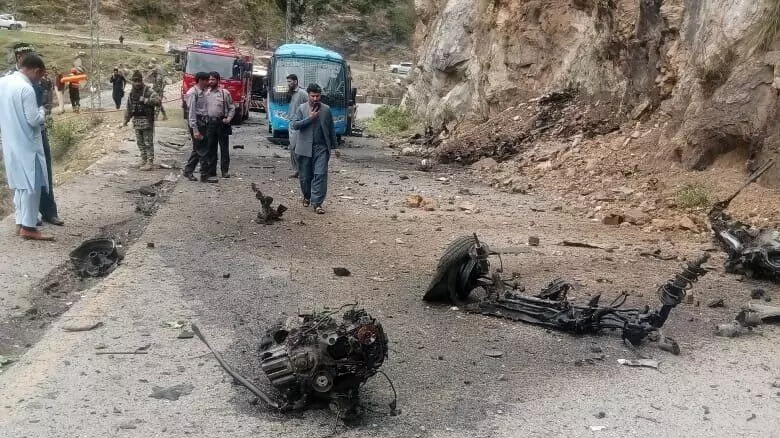Echoes of fragility
Evolving terrorism threats and internal fragility of Pakistan provide a ready recipe for catalysing unabating attacks on Chinese nationals in the country—creating a rift between the two allies

Pakistan seems to be undergoing a phase of grave uncertainty due to rising security concerns. According to prominent security analysts in the media, the dynamics of terrorism threats have shifted significantly since the Taliban took control in Afghanistan, challenging security institutions to develop an effective strategy to address these risks. However, shifting the blame to the Taliban does not seem fair, as internal weaknesses in Pakistan's security and intelligence machinery remain key factors behind the escalating security concerns.
The current counterterrorism strategy appears to be based on a zero-tolerance approach towards all terrorist groups, including religiously inspired terrorists and insurgents. Yet, this approach has not yielded productive results and has heightened security concerns, particularly for foreign nationals in the country. Chinese nationals, in particular, have been targeted twice within six months, and a convoy of foreign diplomats narrowly escaped an attack while visiting Swat in Khyber Pakhtunkhwa (KP). China, facing specific security threats, has been consistently urging Pakistan to intensify efforts against terrorist groups endangering its interests.
China has been using high-level diplomatic channels to convey its security concerns to the Pakistani leadership. Initially, it pressured Pakistan to announce a comprehensive campaign against terrorism and extremism under the banner of Operation Azm-i-Istehkam. More recently, it urged Prime Minister Shahbaz Sharif to personally oversee the investigation into the latest terrorist attack on Chinese nationals in Karachi.
However, these assurances have done little to alleviate Beijing’s concerns. A recent statement by the Chinese Ambassador to Pakistan, Jiang Zaidong, reflects this frustration. At a public seminar, Ambassador Zaidong rebuffed Deputy Prime Minister Ishaq Dar, rejecting his praise of China’s patience amid security threats. He stated unequivocally that two deadly attacks within six months were unacceptable and called on the Pakistani government to launch a comprehensive crackdown on all anti-China terrorist groups. This means China is visibly upset with the poor security steps taken by Pakistan to ensure Chinese safety and security.
Some security experts believe that full-scale military operations in Balochistan and KP could dismantle terrorist networks. However, this is a contentious demand, as such operations may not be viable. Security analyst Muhammad Amir Rana, writing in Dawn, argues that large-scale military action in Baluchistan would likely complicate the province's political and security crises. For threats emanating from groups like the banned Tehreek-e-Taliban Pakistan (TTP) and the Islamic State Khorasan Province (ISKP), Pakistan requires full cooperation from the Taliban regime in Afghanistan, which the Taliban are reluctant to provide. The alternative—cross-border action to eliminate these threats—comes with significant political and security risks, potentially strengthening ties between the Taliban and the TTP.
If China acknowledges Pakistan’s constraints regarding large-scale military operations, what alternatives remain? China has proposed deeper cooperation in the security sector, including a joint security mechanism, as the current level of formal cooperation between the two countries has failed to build sufficient trust.
During Chinese Premier Li Qiang’s recent visit, a proposal for a joint security mechanism was discussed, and a key outcome of the visit was the signing of agreements to provide Pakistan’s law enforcement agencies, tasked with protecting Chinese nationals, with six bulletproof vehicles and 20 firefighting trucks.
It is believed that Pakistan has not favored a formal Chinese security presence within its borders, having developed extensive infrastructure to secure the China-Pakistan Economic Corridor (CPEC) and protect Chinese nationals. Notably, in 2016, a Special Security Division (SSD) was established, comprising the 34 and 44 Light Infantry Divisions, each with 15,000 troops. According to some reports, the 34 Light Division was created in the same year, followed by the 44 Light Division in 2020. The SSD is further supported by 32,000 security personnel from the Frontier Corps, police, and other agencies. Additionally, there is a dedicated intelligence network designed to detect and eliminate terrorism-related threats. However, despite this robust security infrastructure, sporadic attacks on Chinese nationals have continued, exposing the inefficacy of the intelligence apparatus.
Furthermore, according to Muhammad Amir Rana, the October attack on Chinese nationals in Karachi highlighted vulnerabilities within security institutions and exposed lapses in the enforcement of standard operating procedures (SOPs). While details about the joint security mechanism between China and Pakistan remain limited, it is possible that Chinese private security companies may now become involved in providing inner-circle security for Chinese workers—a step that Pakistan believes shadows its sovereignty. This could be an initial step, and if security threats persist, the cooperation might deepen.
The spate of intermittent terror assaults and the inadequacy of Pakistan’s security establishment exposes the inherent constraints it faces. The approach of Counter-Terrorism (CT) outfits appears amateurish, lacking the professionalism and clarity needed to effectively tackle terrorism. To prevent groups like the TTP or other terror affiliates from targeting foreign nationals or critical infrastructure, Pakistan’s counterterrorism mechanisms must adopt a proactive, professional strategy. This includes deploying dedicated personnel with a clear roadmap to guide foot soldiers operating on the ground.
The writer is a retired IPS officer, Adviser NatStrat, and a former National Security Advisor in Mauritius. Views expressed are personal



